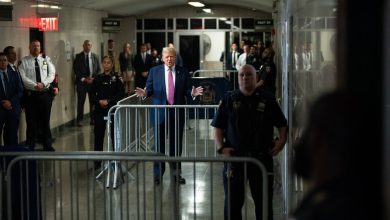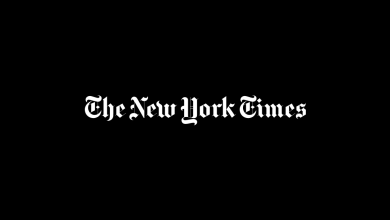The C.E.O. Silence on the Jan. 6 Hearings


Cassidy Hutchinson testified before the House yesterday.Credit…Doug Mills/The New York Times
The C.E.O. silence on the Jan. 6 hearings
Andrew here. I want to speak with you directly this morning, much as I did after the attack on the U.S. Capitol.
After Jan. 6, corporations across the nation raced to put out news releases condemning the insurrection, as well as the Republican members of Congress who tried to overturn the election results. Many companies pledged to end or pause donating to those politicians.
Fast-forward to today. Whatever your politics, yesterday’s testimony by a former White House aide about President Donald Trump’s actions on Jan. 6 was deeply disturbing. And yet you will most likely hear only one thing from the business community in the coming days: silence.
Why?
I’ve been spending the past several days at the Aspen Ideas Festival asking chief executives and other leaders that very question. What I hear again and again is that the business community — and perhaps the public at large — has outrage fatigue.
But there is something else happening, too: Those who do want to speak out are concerned about retaliation from political officials and a significant portion of the public, in ways they weren’t a year and a half ago.
Several C.E.O.s I spoke with pointed to various polls showing that Trump remains popular — in many cases, more popular than President Biden.
Others fear being labeled “woke,” and worry about being targeted by outspoken Republicans like Gov. Ron DeSantis of Florida, who was once seen as a friend of business but who has aggressively targeted companies that are out of step with his views.
But here is my question for business leaders: After years of talking about moral courage, where is yours?
American business has succeeded all of these years because we have been a nation of laws, and a democracy that the world believed in. If that democracy and its laws are not defended, the environment that has allowed American companies to prosper will no longer be a sure thing.
HERE’S WHAT’S HAPPENING
Bed Bath & Beyond is replacing its C.E.O. The company announced the departure of Mark Tritton this morning, along with quarterly results that fell far short of analyst expectations, sending its shares down 13 percent in premarket trading.
The S&P 500 is down about 20 percent in 2022, on pace for its worst first half of the year since 1970. It closed down nearly 1.6 percent yesterday, and futures were down slightly this morning. Amid investor concerns over slipping consumer confidence and slightly rising retail inventories, the Fed Chair Jay Powell will address the European Central Bank forum today.
A former White House aide’s Jan. 6 testimony could put Trump closer to criminal charges. Some legal scholars said the aide, Cassidy Hutchinson, made the best case to date that Trump had in fact incited the crowd. Meanwhile, in Tuesday’s primaries, Colorado Republicans rejected two election deniers, while Illinois Republicans supported two candidates who refused to accept the 2020 results.
The F.T.C. accuses Walmart of facilitating consumer fraud through its money transfer business. The agency said in a lawsuit that Walmart “turned a blind eye” while fraudsters stole as much as $197 million from 2013 to 2018. Walmart called it a “factually flawed and legally baseless civil lawsuit.”
Tesla is laying off around 200 people in San Mateo, Calif., and closing its office there, Bloomberg reported. Most of those laid off were hourly workers who annotated data for Tesla’s Autopilot feature. Tesla’s C.E.O., Elon Musk, had said 10 percent of salaried workers would be laid off, but that the number of hourly employees would increase.
Head of consumer bureau inflames the Chamber
The Chamber of Commerce is targeting Rohit Chopra, the director of the Consumer Financial Protection Bureau, in a public campaign, accusing him of trying to “radically reshape” the financial services industry.
As part of the campaign, which began yesterday, the trade group shelled out six figures for advertisements seeking to “rein in” an “out-of-control” Chopra. The group also filed six requests for records of communications between Chopra’s agency and the White House, and it sent two letters to the consumer bureau detailing what the Chamber called “imprudent and unlawful actions.” (One letter lays out the group’s objection to the agency’s policy tweak on examining financial institutions for discriminatory practices.)
A spokeswoman for the agency told DealBook: “Scare tactics orchestrated by lobbyists for Big Tech and Wall Street won’t deter the work of the C.F.P.B. to enforce the law.” She added: “Less than a year in, our approach is already paying dividends, with significant changes in bank overdraft policies and major reforms in the reporting of medical debt to consumer credit reports.”
The trade group’s move reflects growing fears in some Washington circles that Chopra has amassed too much influence since taking up the post in October. The Chamber’s chief policy officer, Neil Bradley, told DealBook in an email that Chopra’s efforts would “upend the financial service system” and that the group was hoping for “congressional oversight.”
The right has accused Chopra of unfair maneuvering, and the left has hailed him as a hero of the people. During a hearing in April, Patrick Toomey of Pennsylvania, the top Republican on the Senate Banking Committee, said the consumer agency had abused its power under Chopra. (Toomey did not respond to a request for comment on the Chamber’s campaign.) Separately, the American Economic Liberties Project, a progressive competition policy group, said in a statement yesterday that Chopra was “a cleareyed fighter for workers, small businesses and local communities,” and that corporate lobbyists were trying to discredit him with “a targeted smear campaign.”
The director was once warmly welcomed by Republicans. In 2018, senators unanimously confirmed Chopra after Donald Trump nominated him to the Federal Trade Commission. Lawmakers knew Chopra from his previous roles at the C.F.P.B. and the Education Department, and Republicans did not then object to the appointment of a protégé of their progressive colleague, Senator Elizabeth Warren of Massachusetts. But at the F.T.C., Chopra’s tactics and approaches quickly drew ire from the right, and by last year, when he was Biden’s pick for C.F.P.B. director, 48 Republicans opposed him and two did not vote.
The chances of a recession are rising
One of Wall Street’s biggest optimists, Cathie Wood, is throwing in the towel on the economy. Yesterday, Wood, who manages the struggling Ark Invest E.T.F.s, said the U.S. had already entered a recession. Many economists say high inflation, rising interest rates, shaky economic activity and volatile markets have made a recession more likely.
Key Revelations From the Jan. 6 Hearings
Making a case against Trump. The House committee investigating the Jan. 6 attack appears to be laying out evidence that could allow prosecutors to indict former President Donald J. Trump, though the path to a criminal trial is uncertain. Here are the main themes that have emerged so far:
An unsettling narrative. During the first hearing, the committee described in vivid detail what it characterized as an attempted coup orchestrated by the former president that culminated in the assault on the Capitol. At the heart of the gripping story were three main players: Mr. Trump, the Proud Boys and a Capitol Police officer.
Creating election lies. In its second hearing, the panel showed how Mr. Trump ignored aides and advisers as he declared victory prematurely and relentlessly pressed claims of fraud he was told were wrong. “He’s become detached from reality if he really believes this stuff,” William P. Barr, the former attorney general, said of Mr. Trump during a videotaped interview.
Pressuring Pence. Mr. Trump continued pressuring Vice President Mike Pence to go along with a plan to overturn his loss even after he was told it was illegal, according to testimony laid out by the panel during the third hearing. The committee showed how Mr. Trump’s actions led his supporters to storm the Capitol, sending Mr. Pence fleeing for his life.
Fake elector plan. The committee used its fourth hearing to detail how Mr. Trump was personally involved in a scheme to put forward fake electors. The panel also presented fresh details on how the former president leaned on state officials to invalidate his defeat, opening them up to violent threats when they refused.
Strong arming the Justice Department. During the fifth hearing, the panel explored Mr. Trump’s wide-ranging and relentless scheme to misuse the Justice Department to keep himself in power. The panel also presented evidence that at least half a dozen Republican members of Congress sought pre-emptive pardons.
Trump’s rage. Cassidy Hutchinson, a former White House aide, delivered explosive testimony during the panel’s sixth hearing, saying that the president knew the crowd on Jan. 6 was armed, but wanted to loosen security. She also revealed that Mr. Trump, demanding to go to the Capitol, tried to grab his vehicle’s steering wheel from a Secret Service agent.
The range of forecasts remains wide, The Times’s Isabella Simonetti and Jason Karaian report. Here are some broad estimates from top economists of the chances of a recession in the near term.
Low probability:
-
Deloitte’s Daniel Bachman, who heads the consulting firm’s U.S. forecasting group, says a recession is “less likely than some analysts would have you believe.” Chance of recession: 15 percent.
-
Morgan Stanley’s chief U.S. economist, Ellen Zentner, says “accelerating inflation has been a common precursor to recessions,” but one isn’t likely to hit soon. Chance of recession: 30 percent.
-
Goldman Sachs’s David Mericle and Ronnie Walker believe there is a “feasible though difficult path” to avoid recession. Chance of recession: 30 percent.
Closer to a tossup:
-
JPMorgan Chase’s chief economist, Bruce Kasman, and his team say the “risks are skewed decisively to the upside on inflation and to the downside on growth.” Chance of recession: 35 percent.
-
Citigroup’s global economist Nathan Sheets and his team say recession probabilities are “appreciable and rising.” Chance of recession: 50 percent.
Counting on it:
-
Deutsche Bank’s chief U.S. economist, Matthew Luzzetti, and his team had been looking for a recession by the end of 2023, but now they predict it will come earlier. Chance of recession: Likely.
-
Wells Fargo’s Jay Bryson, the bank’s chief economist, says a recession “seems more likely than not,” though it won’t be “especially deep.” Chance of recession: Likely.
“A lot of people who seemed quite reputable had a lot of confidence. The smaller people get taken advantage of.”
—Ben Thompson of Sydney, Australia, who lost about $45,000 in the crypto crash. As ordinary investors suffer big losses, top executives of crypto companies have emerged relatively unscathed.
Disney’s Chapek gets more time as C.E.O.
After months of speculation, The Walt Disney Company’s board said yesterday that it had renewed Bob Chapek’s contract as C.E.O. for another three years in a unanimous vote. Chapek, who took over from Bob Iger in 2020, has delivered results that have topped Wall Street’s expectations. But he has also been in charge while Disney’s stock price has dropped nearly 40 percent, in part because of the political maelstrom the company found itself in over its response to a new education law in Florida.
Chapek’s big bet on streaming has paid off. Disney added nearly 20 million new subscribers worldwide to its streaming service, Disney+, over the company’s past two fiscal quarters, about 60 percent more than analysts had predicted. But investors have become spooked about the future of streaming, with Netflix losing subscribers for the first time in a decade, prompting a wider sell-off in media stocks.
The contract renewal might mean Chapek can put the Florida debacle behind him. After trying to avoid taking a public stance on the education law — which restricts classroom discussion of sexual orientation and gender identity in some grades — Chapek forcefully denounced the bill. That angeredFlorida’s Republican governor, who revoked Disney World’s designation as a special tax district.
Still, the C.E.O. faces a daunting to-do list. Disney’s balance sheet is still recovering from the coronavirus pandemic. Employee morale needs improving. The company’s business in China has been struggling. Some investors are worried that a possible recession could hurt park attendance and guest spending, and Disney needs the cash to offset losses at its streaming division, which is not expected to be profitable until 2024. Chapek is “the right leader at the right time,” said Susan Arnold, a board chairwoman.
THE SPEED READ
Deals
-
Walgreens abandoned a sale of Boots, the British drugstore chain, after failing to get the valuation it wanted. (Bloomberg)
-
Creative Artists Agency completed its acquisition of its smaller rival ICM. (NYT)
Policy
-
An F.C.C. commissioner wants Apple and Google to remove TikTok’s app from their app stores. (CNBC)
-
Residents of California are getting an inflation bailout. (CNBC)
-
Facebook and Instagram are quick to remove posts offering abortion pills by mail, but not so for guns or marijuana. (AP)
-
Remote work has not ended the gender gap. (Fortune)
Best of the rest
-
The only Tampax factory in North America is paying $25 an hour, but it still can’t get enough workers. (Bloomberg)
-
Hedge funds are ramping up bets against the popular stablecoin Tether. (WSJ)
-
H&M showed customers misleading environmental scorecards for its clothing, an investigation found. (Quartz)
-
In the near future, you’ll be able to reserve a bunk bed in the air. (Bloomberg)
David F. Gallagher contributed to today’s DealBook.
We’d like your feedback. Please email thoughts and suggestions to [email protected].



